Since 1996, Philip W. Eaton has served as the President of Seattle Pacific University, an Evangelical Protestant school of around 4,000 students. Earlier in his career, he spent eight years as a professor of English and American literature followed by eight years in business as a commercial and industrial property developer. Eaton has served on many boards, including the Council for Christian Colleges and Universities, the National Association of Independent Colleges and Universities, and the Christian College Consortium.
Book Basics
Engaging the Culture, Changing the World: The Christian University in a Post-Christian World is Eaton’s proposal for what a Christian university should be in the early twenty-first century. Relying heavily upon the work of sociologist James Davison Hunter, especially his recent book (2010) To Change the World: The Irony, Tragedy, & Possibility of Christianity in the Late Modern World, he argues that Christian universities should be “faithful presences within culture” rather than ivory towers separated from culture for purely academic pursuits. Instead of the hermeneutic of suspicion and postmodern preoccupation with experiential neutrality prevalent in secular universities, he proposes that Christian universities center themselves within the Christian metanarrative as a means of “affirming the way of Christ” while remaining open to engaging other faiths (p.95). Christian universities must endeavor to capture the power of biblical imagination and model genuine community for the benefit of their students and the world. In short, Eaton argues that the Christian university is an alternative university model that is uniquely positioned to change the world.
So What?
As cost of higher education continues to rise at an alarming rate, many are asking questions about the true value and role of colleges and universities. The value of a Christian university education must be established by those who are engaged in Christian higher education rather than those outside of it.
- Do you agree with the premise that Christian universities are alternative universities that must be guided by the Christian story and engaged in culture? Why or why not?
- What type of reform do you feel is needed in higher education in general? How would these changes apply to Christian colleges and universities more specifically?
Philip W. Eaton. Engaging the Culture, Changing the World: The Christian University in a Post-Christian World (IVP Academic, 2011). ISBN: 9780830839292.
